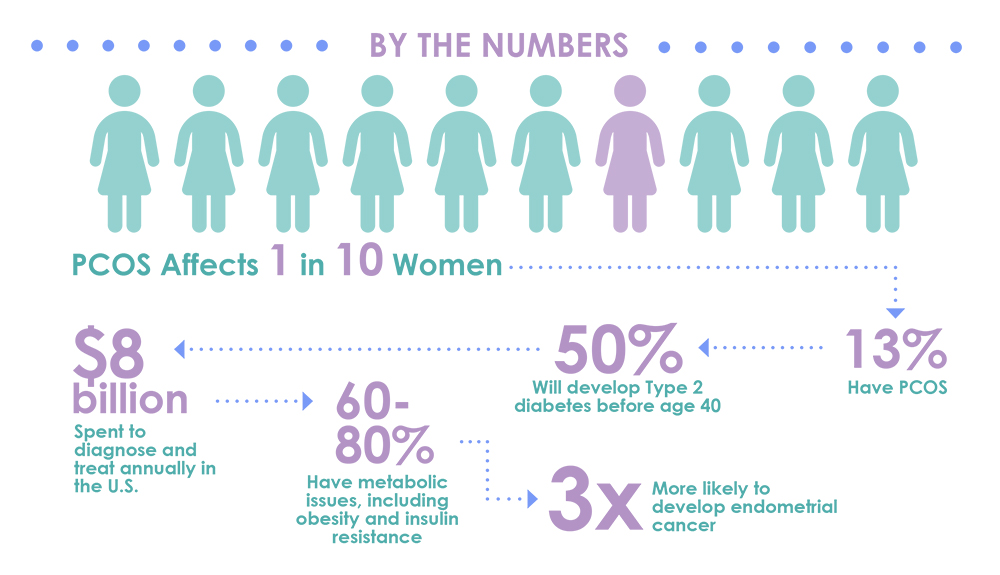ABC’s of PCOS
April 2, 2025
Polycystic ovary syndrome occurs when there is a hormonal imbalance resulting in the lack of ovulation, irregular periods, higher testosterone levels and/or multiple small cysts.
This hormonal imbalance is common and can only be diagnosed when other conditions are ruled out. Lab tests, a physical exam and sometimes an ultrasound are used to detect the condition. Women must have at least two out of the following three issues to confirm a diagnosis:
- Cysts: Women with PCOS typically have multiple small eggs, follicles or cysts causing the overall volume of the ovary to be larger.
- Hyperandrogenism: This occurs when the body experiences higher testosterone levels. Symptoms include abnormal, coarse hair growth, acne and male pattern hair loss. Hyperandrogenism can be detected on an exam or in lab tests.
- Irregular Periods: Women with PCOS frequently do not release an egg each month, leading to irregular periods, and may have fewer than nine periods per year or go more than 35 days between periods.
Women with a mother or sister who has PCOS or who are insulin-resistant or obese are more likely to have the condition as well. The syndrome can impact the body in several of the following ways: - Menstruation: Progesterone is created when an egg is released and signals the body to shed the lining of the uterus. When a woman is not releasing eggs regularly, this lining can build up and cause heavy bleeding and/or uterine hyperplasia (pre-cancer) or cancer. A birth control medication with progesterone can help maintain regular periods and prevent uterine hyperplasia.
- Fertility: Because PCOS interferes with the growth and release of eggs, women may have a harder time getting pregnant. If you are considering pregnancy, talk to your doctor as there are medicines and supplements that may help.
- Abnormal Hair Growth or Acne: Unwanted or coarse hair growth and acne can be disruptive. Be assured these symptoms are common and medication or surgical treatments are available.
- Other Health Issues: Studies show links between PCOS and diabetes, high blood pressure, sleep apnea, cardiovascular disease (heart attack, stroke), depression and anxiety. Women with PCOS should be screened more frequently for diabetes and high cholesterol.
While there is no cure for PCOS, symptoms can be managed. Talk with your doctor to develop a treatment plan.

Related Articles

November 7, 2024
10000 Steps Good Enough
How many steps did you log today? It’s a popular question, and the gold standard answer is 10,000. Yet, depending on your health goals, you may need to pick up the pace.

June 1, 2019
5 Day Meal Prep
Who says eating healthy has to be difficult? One of our Registered Dietitians shows us how easy it can be to prep lunches for a busy week.

June 1, 2019
5 Foods With Health Benefits
Dark ChocolateBoost your mood and your memory (think antioxidants) by savoring dark chocolate. It may also help your heart health. Just 1 oz. is all it takes...

December 9, 2019
5 Free Indulgences
Are you ready for the hubbub of the holidays? The season’s festivities are always fun, but they can also wear you down. If your holiday spirit needs rechargi...

June 1, 2019
5 Minutes to a Happier You
Feeling stressed, angry or anxious? Head to the great outdoors. A new study has found that a five-minute walk can work wonders for your mood.The more natural...

July 27, 2022
5 Must Have Nutrients
Vitamins and minerals do a body good, but who has time to figure out which foods offer what benefits? This short list of five essential nutrients, opens new ...


